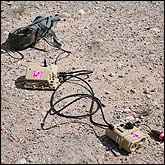 Yesterday the United Nations, by a lopsided 154-3 vote, approved the Arms Trade Treaty. The three “no” votes came from Iran, Syria and North Korea. Joining with those three countries in opposing the treaty will likely be the U.S. Congress, seemingly oblivious to the irony of casting its lot with these three rogue nations.
Yesterday the United Nations, by a lopsided 154-3 vote, approved the Arms Trade Treaty. The three “no” votes came from Iran, Syria and North Korea. Joining with those three countries in opposing the treaty will likely be the U.S. Congress, seemingly oblivious to the irony of casting its lot with these three rogue nations.
Much of the opposition centers on fears that the treaty will allow a transnational body to impose restrictions on domestic sales of guns in the United States. However, the preamble dismisses this concern at the outset, noting that the treaty acknowledges
the sovereign right of any State to regulate and control conventional arms exclusively within its territory, pursuant to its own legal or constitutional system. …
Moreover, the treaty only impacts exports and imports of arms and has no application to any member state’s purely domestic or internal regulation (or non-regulation) of weapons and firearms.
Of primary significance here, however, is that the treaty does not require the United States to do anything other than what it is required to do, and already does, under its own Arms Export Control Act (“AECA”), namely to establish a control list, to regulate exports of items on that control list, and to assure that export licenses are not granted to permit exports of arms to be used in violation of international agreements or to commit genocide or crimes against humanity. These are arguably not any different from the factors set forth in section 38(a)(2) of the AECA to be considered by DDTC in granting export licenses.
What this means is that the real impact of the treaty will be to require countries that do not now regulate their arms exports to start doing so. This would create a more level playing field for U.S. exporters who must get licenses for all weapons exports but who compete against suppliers in other countries which do not regulate weapons export. Â It seems hard to argue against that result.

 Posted by
Posted by  Category:
Category: 

 Have you had a license application pending at the Directorate of Defense Trade Controls (“DDTC”) to export a defense article mysteriously denied? Â If so, you might have been “blue lanterned,” or, more accurately, the end user might have been “blue lanterned.”
Have you had a license application pending at the Directorate of Defense Trade Controls (“DDTC”) to export a defense article mysteriously denied? Â If so, you might have been “blue lanterned,” or, more accurately, the end user might have been “blue lanterned.” Well, today is truly a red letter day in the annals of ITAR registration puffery. For the first time ever (at least that I’ve seen), we have a company
Well, today is truly a red letter day in the annals of ITAR registration puffery. For the first time ever (at least that I’ve seen), we have a company  Buried among all the articles on the recent events on the Hill, the Washington Post snuck in an
Buried among all the articles on the recent events on the Hill, the Washington Post snuck in an  Yesterday the Directorate of Defense Trade Controls (“DDTC”) released its
Yesterday the Directorate of Defense Trade Controls (“DDTC”) released its 

